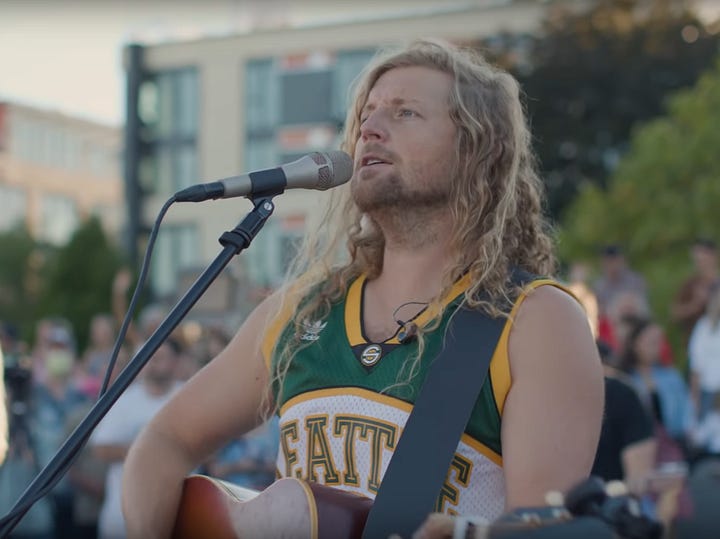I hate to say it, but let the bigot sing
Freedom of expression is more important than one obscure blond-tressed douchebag's repulsive beliefs


I’ve really hesitated to write this post, which will put me at odds with many people I normally consider friends and allies. But as a Canadian cultural and music critic with strong feelings about freedom of expression, I didn’t feel like I could let current events pass without comment.
Thanks to activist pressure, cities across eastern and central Canada have been cancelling permits for U.S. right-wing evangelical (and MAGA) Christian musician Sean Feucht to perform in local parks and similar venues, and cities in the West are still considering doing the same. (Except in Alberta, of course, where they might well make it a provincial holiday.)
Let’s be clear up front that Feucht is a homophobic and transphobic Christian nationalist whose ideology is repulsive to me on every level. But nothing I have seen has cited anything where he has explicitly advocated violence against the groups of people he (like thousands of other Christian preachers in countless places) condemns as ungodly. Though the policies he supports obviously would harm people, that’s unfortunately par for the course in current conservative political discourse. I believe that banning Feucht’s performances helps him by raising his profile as a martyr to his cause—had you heard of him before this month? I certainly hadn’t. And it hurts causes I care about by legitimizing authorities intervening against political speech they don’t like.
I’ll concede there’s a grey area when the events use public spaces instead of private ones. But personally I prefer the state to adjudicate the content of what people say in public as little as possible, while others call it “providing a platform.” This really stretches the definition of a platform. Allowing a wide range of people to use public spaces isn’t an endorsement of whatever they say there—it’s the government’s obligation under our Charter rights to freedom of expression and assembly.
But matters went beyond that this weekend when Montreal fined a church for letting Feucht perform a concert inside its own building. It dredged up bureaucratic rules rarely invoked, and cited “safety” concerns—i.e. that people would protest outside, which is again more free speech they’re trying to prevent—but quickly turned from there to saying the concert was incompatible with “the city’s values.” I mean, when I was in my 20s, if there were a concert poster that said in big letters “INCOMPATIBLE WITH OUR VALUES, SAY CITY OFFICIALS,” I would have been the first in line, wouldn’t you?
Of course I have misgivings about defending Feucht’s right to speak. I hesitate when I see good people like Charlie Angus celebrating the shutdowns as victories. I hesitate when a friend like my fellow critic Steacy Easton tells me this kind of speech is “the prayer before the Klan rally,” says that it will hurt trans and non-binary people like them, and asks how I would finesse the line to prohibit, for instance, a Nazi gathering being held on public property. (Again, I lean towards incitement as the measure, but a clearcut standard will always be unreachable.) These are hard and good questions. I appreciate the pushback.
But there are reasons free speech historically has been primarily a leftist cause. Poor, marginalized, and anti-establishment people are the ones most likely to be deprived of it. The blacklists and censorship of the past should never be forgotten. Yes, right-wing invocations of free speech are almost always self-serving hypocrisy, really meaning they want to be “free” to speak hatefully without being criticized, to impose their values while suppressing anyone else’s. But that’s exactly why holding to a consistent principle is the best defence.
Never mind the past, in fact. Just look at the U.S. now. Look at schools like Columbia knuckling under to state pressure and agreeing to have a Trump overseer vet their course content and governance to stamp out “DEI” and “woke” content and practices (that is, anything that acknowledges racial injustice, among other forbidden ideas) as well as “anti-semitism,” broadly defined to include any criticism of Israel or defense of Palestinians. Look at activists getting expelled from schools or having their visas revoked. Look at the LGBTQ+ and Black history books being removed from schools and public libraries. We could go on all day, but I’ll just add that back in March the half-century-running punk band UK Subs were denied entry to the U.S. for saying mean things about Donald Trump.
Likewise, more directly relevant to the Feucht case, the Carney government here in Canada has been close-lipped about whether it’s considering denying visas to the UK and Irish groups Bob Vylan and Kneecap. Vylan has been barred from the U.S. already. The two bands have also been under criminal investigation by the British government for their pro-Palestinian advocacy in concerts.
There are a couple of things the groups have done that I personally also find objectionable, or at least very dumb: Kneecap holding up a Hezbollah flag on stage (they apologized) and Vylan leading a chant of “Death to the IDF.” I’ll take the bold position that “death to [anybody]” chants are a bad idea. That said, the duo has clarified on their Instagram: “We are not for the death of Jews, Arabs, or any other race or group of people. We are for the dismantling of a violent military machine—a machine whose own soldiers were told to use ‘unnecessary lethal force’ against innocent civilians waiting for aid. A machine that has destroyed much of Gaza.” And they’ve asked audiences at gigs since then not to use the chant.
As Massive Attack articulated well on their instagram, these attacks on artists are at best a distraction from the actual crisis in Gaza and the world community’s ongoing failure to find any remedy. At worst, they’re examples of bad-faith actors making scapegoats out of young creative people who are just expressing their anguish at the scale of the suffering, sometimes clumsily and intemperately.
Many Jewish people, unfortunately, take those bad actors’ word for it and believe that the compassionate and justly upset young musicians in Kneecap and Bob Vylan want to kill Jews. I’m pretty sure they are wrong about that.1 Likewise, Steacy and other people I care about believe that Sean Feucht wants to kill trans and gay people. They could well be right about that. But as far as I can tell, he has not actually said so. And if I don’t want the state to presume to diagnose what Bob Vylan is secretly thinking and punish them for it, I’m afraid I have to say the state shouldn’t do that with Sean Feucht either.
Let’s stop giving the religious right any fodder to claim, insanely, that they are “the only minority you can still persecute”—for which, check out the comment sections on any media story or YouTube video about the Feucht contretemps. For sure, go ahead and picket Feucht’s shows if you want, with gusto. But overall let’s adopt the option most likely to result in none of us ever hearing this idiot’s name again: Let the stupid motherfucker sing.
Not that all pro-Palestinian activism is free of anti-Jewish bias and hatred, sadly. But it becomes all the harder to root out when opponents claim that anyone critical of Israel’s actions is automatically anti-semitic, including other Jews.

I completely agree. The hype against guys like this just draws more attention to them. I remain convinced that ignoring ignorant people will contribute to them going away. Not always since we, as humans, seek out those with whom we agree but maybe fewer people find this knucklehead.
At one point in my youth, I endorsed some measure of censorship, just as I see promoted on the left and right now. Back then, it was just us (at the time) conservatives who did that. "When I was a child, I spoke like a child, I thought like a child, I reasoned like a child. When I became a man, I put away childish things" (1 Corinthians 13:11). Thankfully, I grew and believe I see things more clearly now. An old friend who grew up in a Communist country helped correct my thinking, who shared that we should not silence bad ideas and arguments but rather confront and challenge them with better ideas and arguments. Silencing doesn't make those bad ideas go away, just go underground where they fester and sometimes become worse.
Thanks for writing & sharing this, thanks for working through the stickiness and complexity. It's helped me clarify my own thinking about this type of scenario. Thank you also for not invoking the tiresome Voltaire/Candid line about free speech.